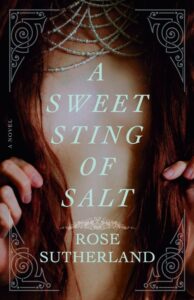Buy this from Bookshop.org to support local bookstores and the Lesbrary!
I couldn’t tell you why, but I am obsessed with sapphic selkie stories. There are very few of them out there, but I leap on the chance to read any that I stumble upon. Don’t get me wrong: I like sapphic mermaids, too, but there’s something about a sapphic selkie story that hooks me like no other. So it’s not surprise that A Sweet Sting of Salt was one of my most anticipated releases of the year.
This is such an immersive story. It’s a Nova Scotia gothic, and I could feel the spray of waves crashing against rocks as I read it. Sutherland describes this seaside town in loving detail, even as the main character has a less rosy view of it. Jean has been an outsider since she was caught with another woman when she was younger. Her girlfriend was sent away to marry a French man—despite not being able to speak French—to Jean’s heartbreak. Luckily, Jean was taken in by the local midwife, and now she has earned the town’s begrudging respect as an extremely skilled midwife herself.
Helping someone give birth is an everyday occurrence for Jean, but not the way it happens this night. She wakes up to the sound of a woman screaming outside and finds a stranger in labour outdoors in the middle of a storm. She brings Muirin inside and helps her, though Muirin doesn’t speak any English. Jean finds out that Muirin is the wife of her neighbour Tobias, but it’s very strange that Tobias didn’t let her know about the pregnancy, and Muirin is reluctant to go home.
As you’d expect from a gothic, the tension and danger slowly ratchets up over the course of the story. First, we get to see Muirin and Jean become friends as Jean teaches her English and assists with the baby. Jean’s mother committed suicide shortly after she was born, so she’s attentive to new mothers’ mental states, determined to prevent that from happening to any of her charges. Soon, though, she finds herself falling for Muirin in spite of her best efforts not to.
Maybe it’s inevitable in this sort of story, but I was surprised that the main character doesn’t find out that Muirin is a selkie until well into the book. It’s in the marketing, so the reader knows right away. I don’t love having information the main character doesn’t for that long, but that’s a personal preference.
By the end of A Sweet Sting of Salt, I was reminded of Carmen Maria Machado’s “The Husband Stitch.” “The Girl With the Green Ribbon” and “The Selkie Wife” share a similar premise, a women’s horror story: the idea of sacrificing everything for your husband/children and it not being enough. Women are so often expected to be completely subsumed by the role of wife and mother until there’s nothing left that’s just theirs. These feminist retellings make that message shine through, and they show that a truly loving and equitable relationship means being able to keep something for yourself.
I liked the dynamic between the practical to a fault Jean and mysterious, passionate Muirin. Muirin picks up language at an unnatural rate, so they are able to communicate even when they don’t completely share a language. I also appreciated the side characters, including Jean’s mentor midwife and mother figure, who is Indigenous, and a character who is coded autistic. I always appreciate when historical fiction has a diverse cast. We also get to see how Jean’s former girlfriend’s life turned out, which was a pleasant subversion of my expectations.
While I didn’t like knowing the reveal hundreds of pages before the main character did, that was a pretty minor complaint. A Sweet Sting of Salt was an immersive read perfect for fans of queer retellings, folklore, gothics, and seaside settings.


